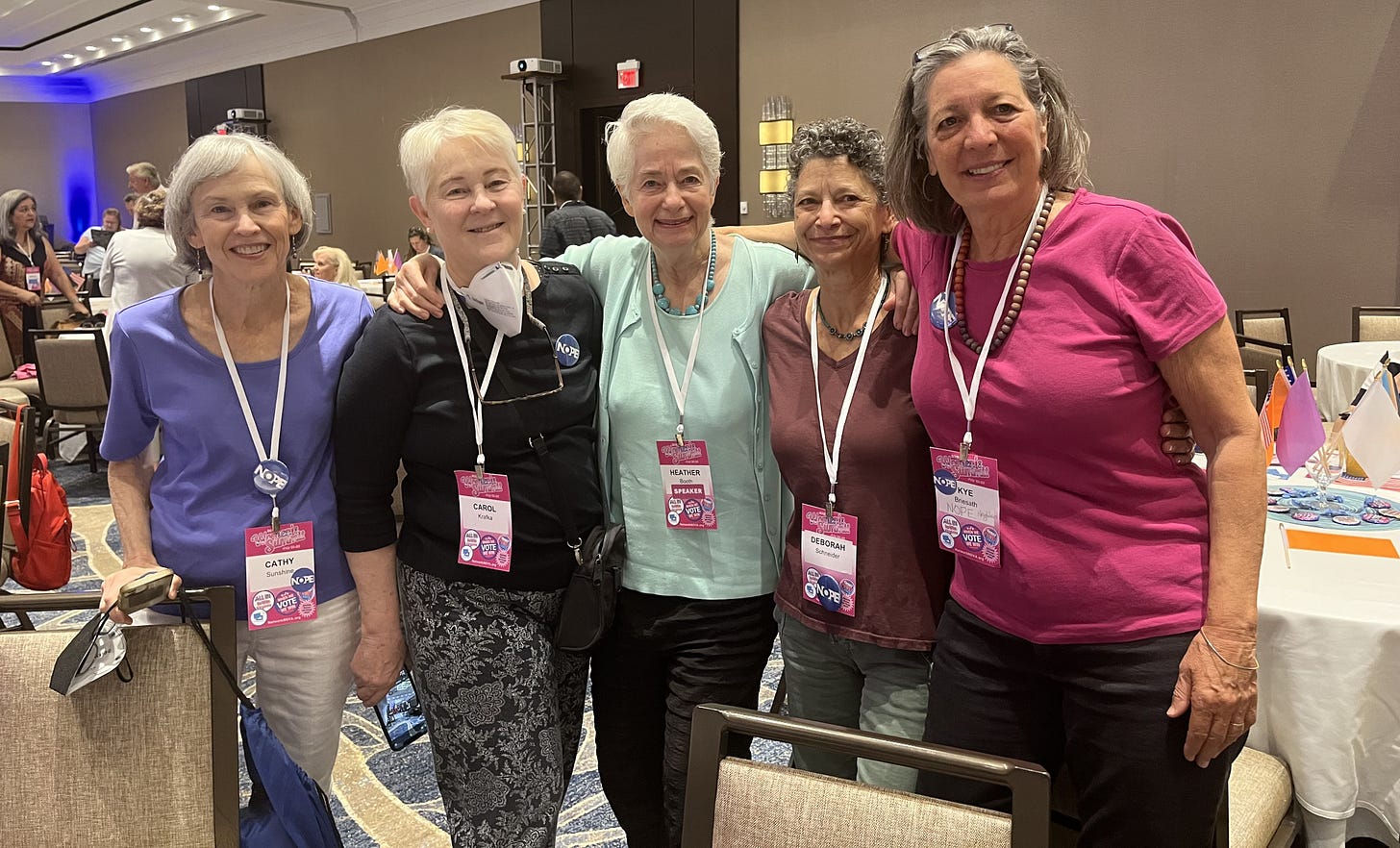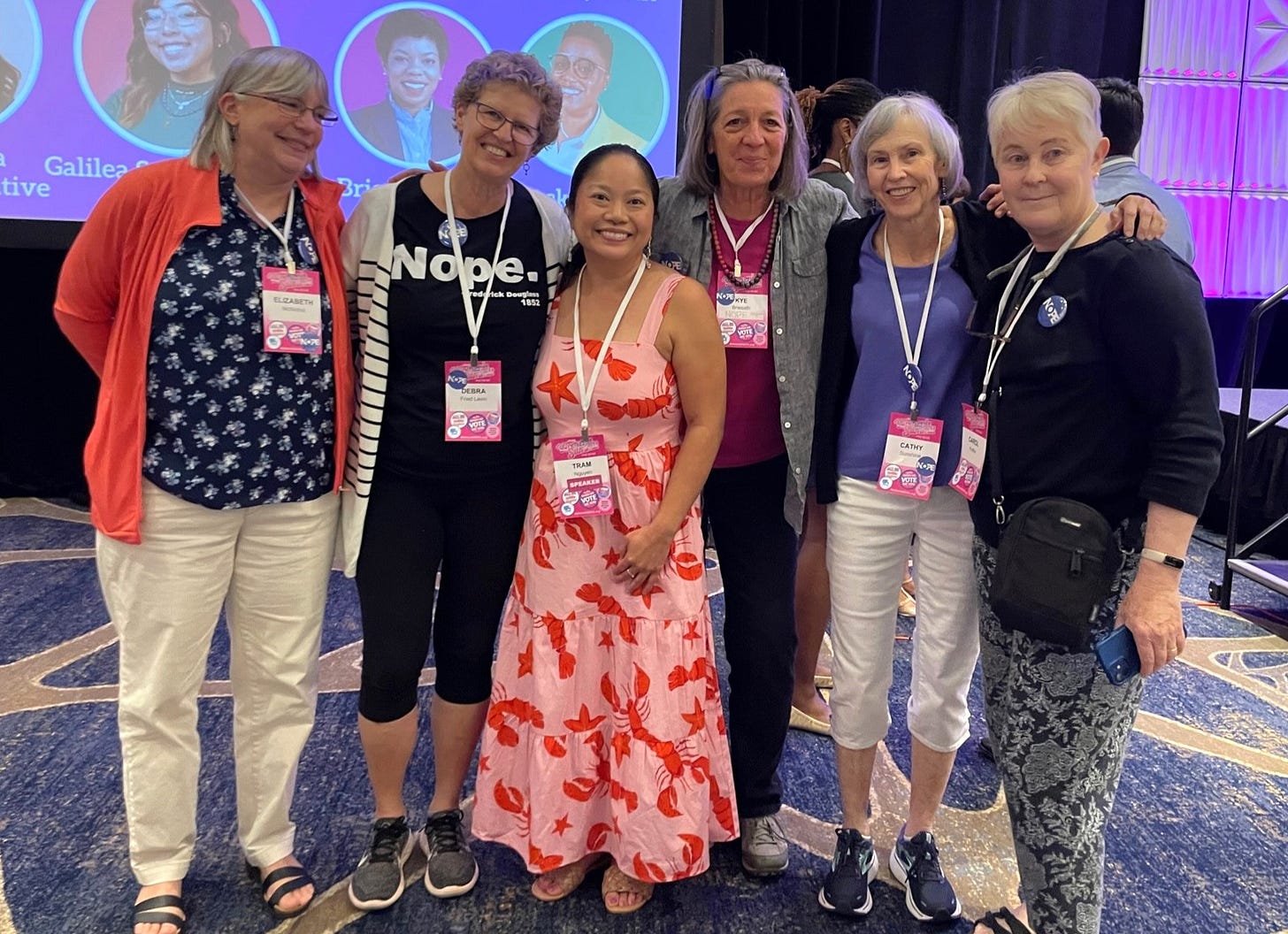
The senior male politician was holding forth, blowing past his time limit. That’s when moderator Katherine White leapt up and strode across the stage, grinning and waving a colorful flag in the air. Senator Tim Kaine of Virginia promptly wound up his remarks. Who knew it was so easy to get a politician to stop talking?
To his credit, Kaine was unruffled and seemed in on the joke. It was one of my favorite moments in the 2023 Women’s Summit, which brought together activists, legislators, and candidates to build energy ahead of Virginia’s legislative elections this November.
Readers who live far from Virginia may be tempted to stop reading. But I hope you won’t, because last weekend’s event had broader relevance. It spoke to me of the outsize role that women are playing in progressive politics and of the ways in which activism has changed.

Women in charge
I’d stepped off a red-eye from Seattle 24 hours earlier, and the day started in a blur. But a group of us from NOPE made the short trip from DC across the Potomac, where the exuberant crowd at the McLean, Virginia, Hilton jolted me awake.
There were a few men there, to be sure, but the vast majority of the activists, candidates, and elected officials who packed the conference space were women. Many of them looked to be over 50. This fit with what I’ve seen while canvassing: third-age women have become a force in grassroots activism, especially since the 2016 election, when they emerged in large numbers to work against Trump.
The three-day summit was as smoothly orchestrated as any political event I’ve attended. The lineup of speakers moved along briskly, and the breakout workshops were carefully curated. The summit organizers – the self-described “unstoppable, badass, fearless women” of Network NOVA, a Virginia coalition – knew what they were doing. They ran the event with a firm hand.

A half century ago, women struggled to assert themselves within the antiwar, labor, civil rights, and anti-apartheid movements, which were largely run by men. I recall my conversation with Ann Francis, a longtime activist now in her eighties:
ANN: During Vietnam organizing, there was consciousness among women, recognizing that maybe they didn’t have a place at the table and in a lot of the decisions that were being made.
CATHY: Do you mean within the antiwar movement?
ANN: Sure. I went to a conference in Chicago organized by the Committee of Returned Volunteers. And these guys [running the conference] were probably big names that you would know. But all of a sudden, the women in the room stood up and said, “We’re leaving. We’ve tried to say our piece, you won’t listen, and we’re going to the basement.” And all the women stood up and walked out. So I felt, well, I’ll go. And that was a beginning awareness, starting to see how to have a voice.
Today, it’s hard to imagine a progressive gathering where overbearing males would be given a free pass. Grassroots political groups all over the country are led by women and powered by female staff and volunteers. These women work for low or no pay in most instances, yet are highly professional and effective in their roles. And they command respect.
“Why women?” I asked Debra Fried Levin, leader of NOPE, the all-volunteer group I work with. “I don’t know!” she laughed. “Where are the men?” Of course, there are plenty of male organizers; we know them, work with them, appreciate them. But especially since 2017, the preponderance of women in this sphere is unmistakable. “The Trump election catalyzed it for many of us,” Debra said. “Women were infuriated by Trump. Everyone went to the women’s march the day after his inauguration. After the march, we looked at each other and asked, what do we do now? For seven years since then, we’ve been learning the ropes of organizing. Most of us are volunteers. There’s no ego. We get stuff done.”

New respect for the ballot
In the 1970s and ’80s, I vaguely recall, many of us involved in antiwar and social justice movements didn’t pay much attention to who voted for whom. The two parties were considered to be roughly the same, the chance of progressive wins nil. McGovern’s 1972 candidacy gave me and other young people our first experience of knocking on doors, but it failed dismally, becoming the exception that proved the rule.
Half a century later, and especially since the elections of Obama and Trump, there’s new recognition of the voting booth as a critical arena for action. Elections matter. There’s an understanding, as well, that with mounting GOP efforts to suppress the vote and overturn elections, our democracy is something we need to defend. We still march, but the emphasis has shifted to long-term efforts to recruit and train candidates, register new voters, protect voting rights, and turn out votes. This requires direct, sustained contact with potential voters through registration, canvassing, phone banking, and letter writing.

It also requires organizing year-round on issues people care about, like health, housing, education, racial justice, and climate change, so that when an election rolls around, they’re already engaged. This organizing is being done by a myriad of local groups across the country, working in their own communities, relying on local staff and volunteers. Flying largely under the radar, these groups have tiny budgets and are independent from the Democratic Party apparatus. Yet they’re increasingly effective, thanks largely to the leadership of seasoned women activists. Consider a small sample of the workshops on offer at the Women’s Summit:
Achieve Success in Canvassing
Enhance Your Phone Banking Skills
Messaging for Action on Climate Change
Understanding and Overcoming the Rural/Urban Divide
Building Progressive Organizations for Longevity and Impact
So, You Want to Run for Office

The predominance of women as organizers hasn’t yet translated into parity with respect to women in office. In 2023, just 33 percent of state legislators nationwide are women, and percentages at the national level are even lower. That’s changing, albeit slowly. Last weekend’s event featured a dynamic cadre of women who serve in the Virginia House of Delegates and the State Senate. While Glenn Youngkin, the Republican governor, presses his right-wing agenda and eyes the presidency, a new generation of female legislators, many of them Black, Asian, or Latina, is bringing progressive values and new energy to Virginia politics.
By day’s end I was exhausted, ready to enjoy ice cream in the parking lot before heading home to DC. But I’ll be back in Virginia this fall, knocking on doors to flip the Virginia House of Delegates blue in November. Protest marches are necessary, but they’re not enough. Someone has to do the unglamorous work of reaching out to voters, working with them on issues, and mobilizing their votes. It’s happening in Virginia, and around the country, and women are leading the way.




Thanks for sharing. We know that leadership that includes women is the only way we have a chance of succeeding in real political change!
Thank you for the boost! Means so much to hear your feedback!!